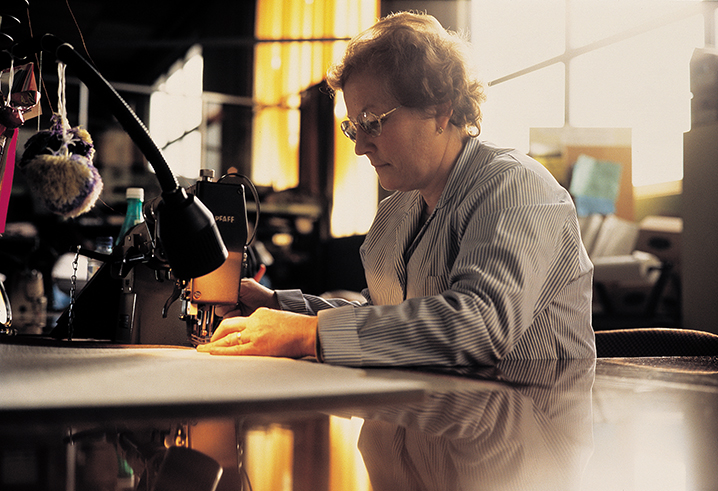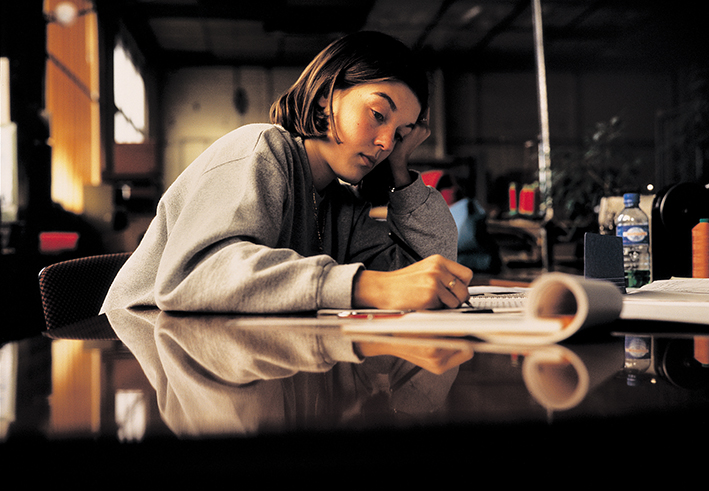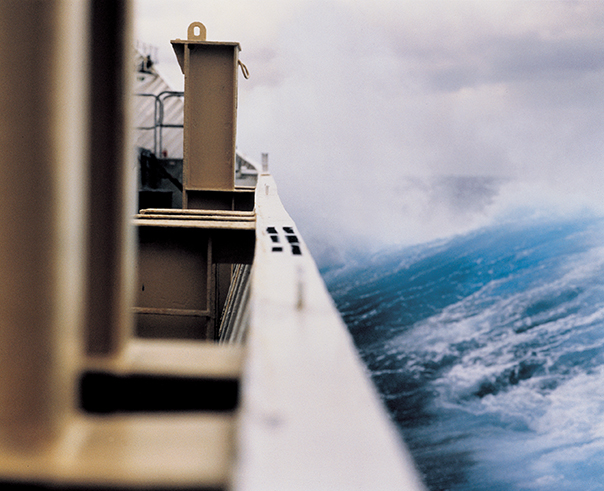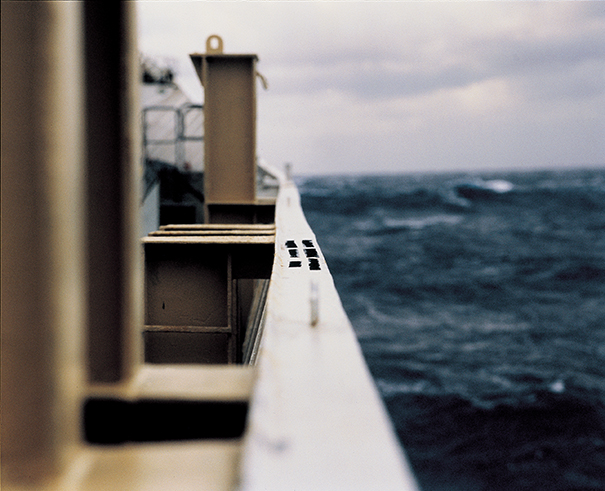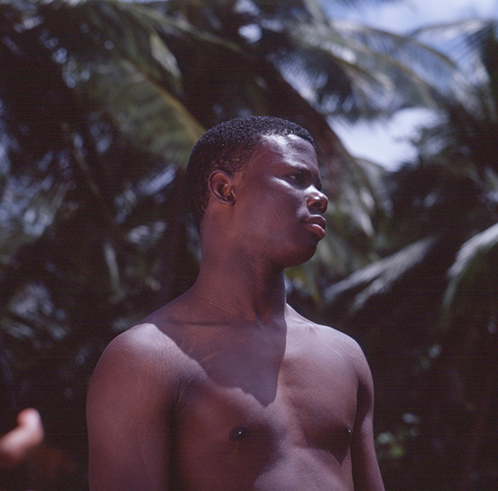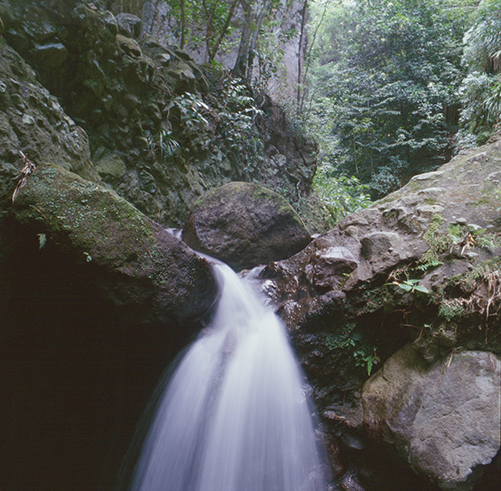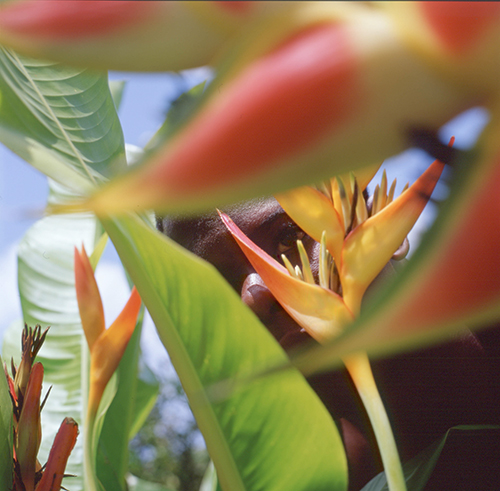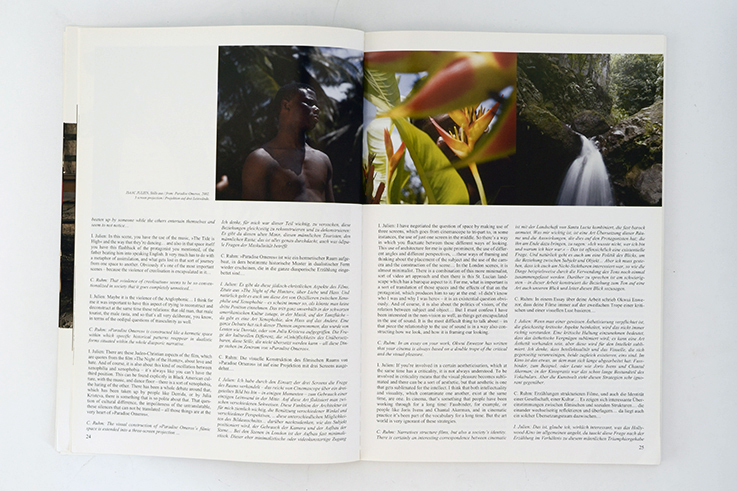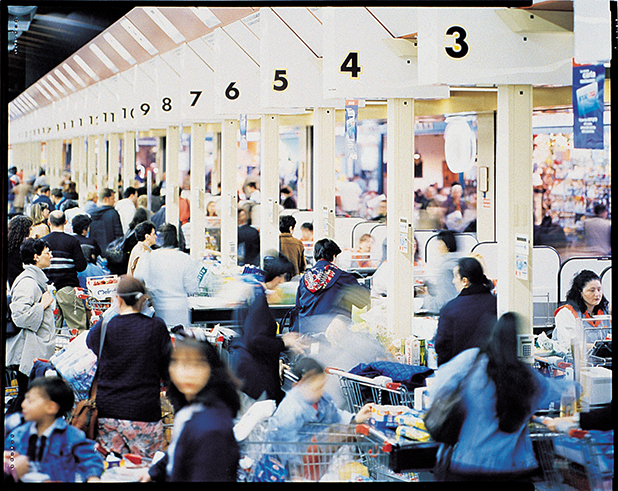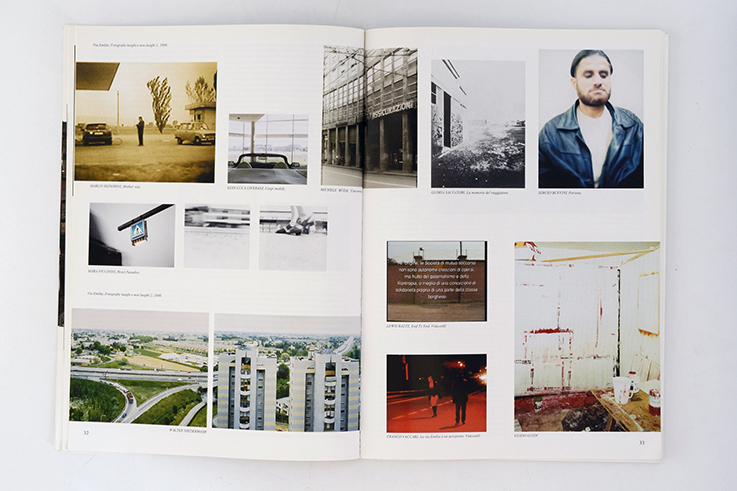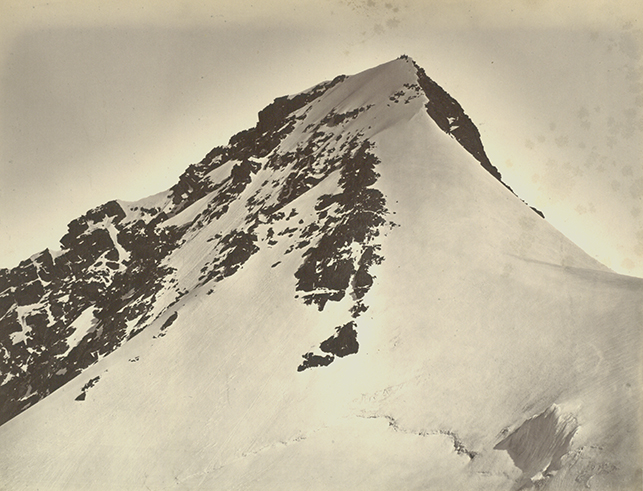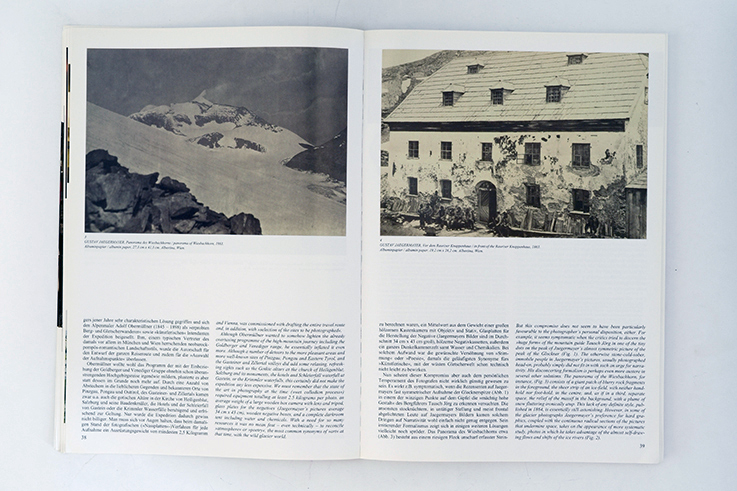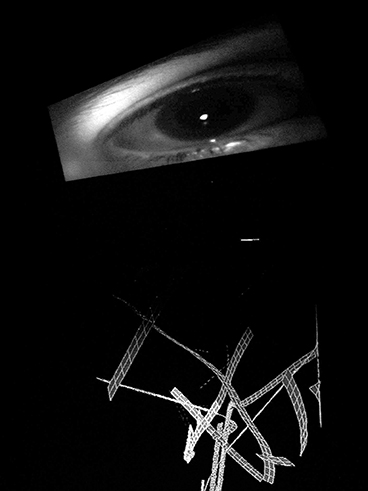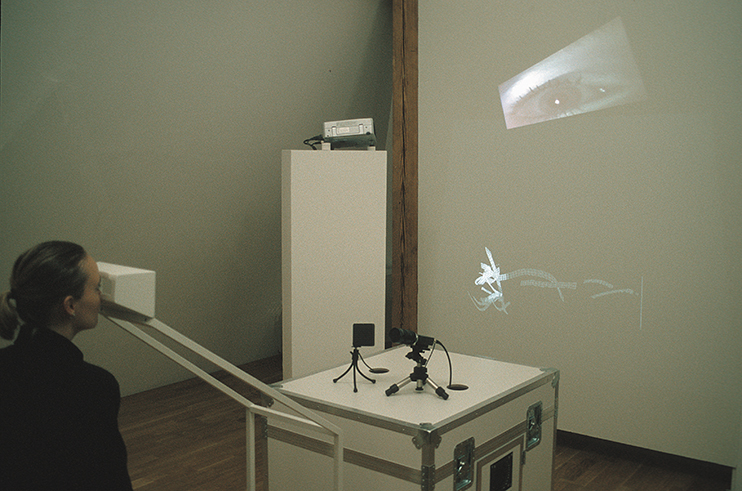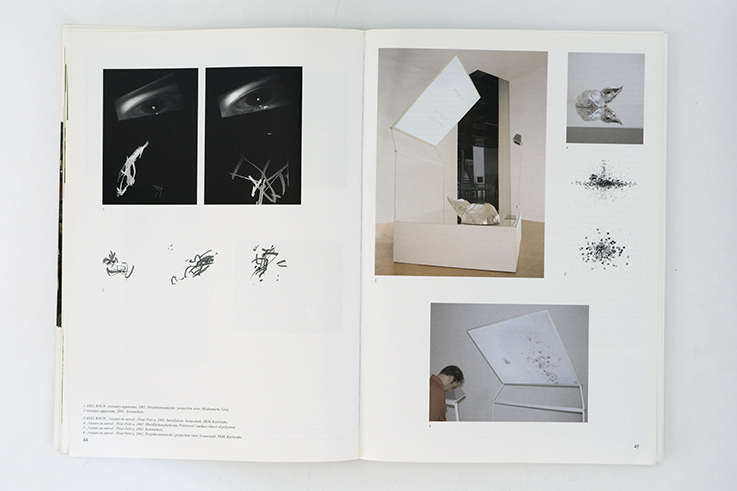Camera Austria International
79 | 2002
- ALLAN SEKULA
TITANIC's wake - ALLAN SEKULA
- CONSTANZE RUHM
Isaac Julian: Spaces of Translation: Speaking One Language, Understanding Another... A Coversation with Contanze Ruhm - ISAAC JULIEN
- THILO KOENIG
Linea di Confine per la Fotografia Contemporanea. A conversation with William Guerrieri - MAREN GRÖNING
From the Early Days of Photography and Alpinism in Austria - AXEL ROCH
Faces of Seeing. For a gaze in the temporal in-between of images - AXEL ROCH
- ROLF SACHSSE
Netz - Bild - Haut - KRYSTIAN WOZNICKI
Aesthetics of Globalisation

Preface
“Waiting for Tear Gas” is the title of a series of new works by Allan Sekula that we will be presenting on 4 October to mark the official presentation of the 2001 Camera Austria Award of the City of Graz for contemporary photography at the Camera Austria exhibition rooms. In this work, created during the World Trade Conference in Seattle in the late autumn of 1999, Sekula documents the demonstrations that sparked off a wave of protests by anti-globalisation groups. “Waiting for Tear Gas” is presented as a sequence of slide-show images; in “TITANIC’s wake”, in contrast – the work presented in this issue – Sekula deals with the problem of globalisation in a sequence of images accompanied by a commentary.
Entries
Forum
MARCELLA PICCININI
SARAH ANAHORY
CHLOË POTTER
KARL CEBUL
JEAN RUITER
JENS SUNDHEIM
MARTIN KOLLÁR
ANDREAS BÖHMIG
KOICHI KURODA
DENIS DEFIBAUGH
ANNETTE KELM
Exhibitions
Documenta 11. Kassel
KIRSTY BELL
Zu viel ist nicht genug.
Documenta 11. Kassel
FRIEDRICH TIETJEN
Ron Galella
The Andy Warhol Museum, Pittsburgh; Paul Kasmin Gallery, New York
CARLO MCCORMICK
Iconoclash
ZKM, Karlsruhe
SANDRO DROSCHL
Adrian Piper – seit 1965: Metakunst und Kunstkritik
Generali Foundation, Wien
SØNKE GAU
Matthew Barney: The Cremaster Cycle
Museum Ludwig, Köln; Musée d’art moderne de la Ville de Paris; Guggenheim Museum, New York
HIAS WRBA
Andy Warhol Retrospective
Neue Nationalgalerie, Berlin; Tate Modern, London; MOCA, Los Angeles
SANDRA WAGNER
Manifesta 4: Europäische Biennale zeitgenössischer Kunst
Frankfurt / Main
RUTH NOACK
Chic Clicks: Modefotografie zwischen Kunst und Auftrag
ICA, Boston; Fotomuseum Winterthur; NRW-Forum, Düsseldorf
CAROLIN FÖRSTER
Hannah Starkey
Maureen Paley / Interim Art, London
ROY EXLEY
Erwin Wurm: Fat Survival – Handlungsformen der Skulptur
Neue Galerie, Graz; Centre National de la Photographie, Paris; Galleria d’Arte Moderne, Bologna; ZKM, Karlsruhe
JULIA GARIMORTH
James Coleman
Lenbachhaus / Kunstbau; Städtische Galerie, München
RUTH NOACK
Albert Oehlen: Revisited
Galerie Max Hetzler, Berlin
ANKE KEMPKES
Hans Weigand: Cotton 2001 / Jerry Cotton 2002
Wiener Secession; Museum Ludwig, Köln
BRIGITTE HUCK
Gosbert Adler, Robin Collyer: Photoworks
Goethe Institut Gallery, Toronto
CAROLIN FÖRSTER
William Christenberry: Keep it straight
Die Photographische Sammlung / SK Stiftung Kultur, Köln
KERSTIN STREMMEL
Almut Rink: Sector No Limits
Galerie 5020, Salzburg
SØNKE GAU
Korrelaatioita / Korrelationen
Fotogalerie Wien
NINA SCHEDLMAYER
Die Leichen im Keller der jüngeren Geschichte. Der Terrorismus der siebziger Jahre im deutsch-sprachigen Dokumentarfilm
HIAS WRBA
Books
Tom Holert / Mark Terkessidis: Entsichert. Krieg als Massenkultur im 21. Jahrhundert
KiWi, Köln 2002
KRYSTIAN WOZNICKI
BLINK
Phaidon Press, London 2002
MAGDALENA KRÖNER
Open City – Street Photography since 1950
Hatje Cantz Verlag, Stuttgart 2001
MARIE RÖBL
Let’s Move – Michel Frizot: Etienne-Jules Marey
Nathan / Delpire, Paris 2001
FABIAN STECH
Aura Rosenberg: Berliner Kindheit
Steidl Verlag, Göttingen / DAAD, Berlin 2002
GERHARD FROMMEL
Elfriede Mejchar: Flower Fade (Blühen / Verblühen)
Christian Brandstätter Verlag, Wien 2002
TIMM STARL
Imprint
Publisher: Manfred Willmann. Owner: Verein CAMERA AUSTRIA, Labor für Fotografie und Theorie
Lendkai 1, A-8020 Graz
Editors: Christine Frisinghelli, Maren Lübbke
Editorial assistats: Heidi Oswald, Anja Rösch, Nora Theiss
Translations: Wilfried Prantner, Richard Watts

